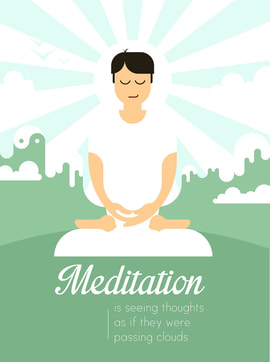 Our modern lifestyle is synonymous with stress. Our lives are so rushed that we rarely have the time to pause and acknowledge the stress we experience. Pretty much every area of our lives are a source of stress – from juggling our deadlines at work and completing household chores to meeting financial obligations and managing family responsibilities. Most of us just accept stress as inevitable which is why we don’t take steps to reduce our stress levels. However, stress doesn’t just affect our mental and emotional health as research shows that stress also affects our physical health. How Chronic Stress Affects the Body Impacts Heart Health Chronic stress increases your risk of high blood pressure, abnormal heart rhythms, heart attacks and heart disease. When you get stressed, your body releases a flood of the hormone cortisol which increases your heart rate and tenses your muscles. While the occasional stress response does not have a lasting impact on your health, chronic stress causes high levels of cortisol for prolonged periods. Research indicates that high levels of cortisol from long-term stress can increase blood pressure and the levels of blood cholesterol, triglycerides and blood sugar – the most common risk factors for heart disease. Stress also promotes the build-up of arterial plaque which limits blood flow and increases the risk of a heart attack. Increases the Risk of Sexual Dysfunction Sexual dysfunction is a common problem that affects approximately 31% of men and 43% of women in our country. Sexual dysfunction includes issues such as erectile dysfunction and premature ejaculation in men and a lack of sexual desire, the inability to become aroused and the lack of orgasm in women. Erectile dysfunction is one of the most common sexual dysfunction problems as it affects about 18 million American men over the age of 20. Studies show that psychological factors such as stress are the most common cause of ED. Counseling, therapy and stress reduction methods can help to prevent and treat stress-related sexual dysfunction. Triggers Skin and hair problems Studies show that stress is closely associated with a variety of skin problems including acne, psoriasis and eczema. High stress increases the production of sebum which increases your risk of an acne breakout. Stress can also trigger an immune reaction which can result in autoimmune diseases such as alopecia and vitiligo. Stress and skin or hair problems are closely linked and can form a vicious cycle where stress triggers skin and hair problems that cause an individual further stress. Researchers found that there is a 30-40% incidence of psychiatric issues such as stress, anxiety and depression among dermatological patients. Greatly increases the risk of Obesity and other Eating Disorders The National Center for Health Statistics for 2015-2016 estimates that 39.8% of adults (20 years old and over) were obese while an additional 31.8% were overweight. Changes in eating habits play a key role in the obesity epidemic but the underlying cause for these dietary changes is stress. Studies show that chronic stress triggers the craving for “comfort foods” which are high in sugars and fats. This is why people with chronic stress are at a much higher risk of obesity and other eating disorders such as binge eating and bulimia nervosa. Increases the Frequency and Intensity of Headaches When you experience stress, your muscles tense up in anticipation. Chronic stress keeps your neck and scalp muscles tense for a prolonged period which can trigger a tension headache. According to health experts, tension headaches are the most common type of headache. Chronic stress can also increase your risk of a migraine headache. Unlike tension headaches (that are not debilitating), a migraine headaches is an intense throbbing pain that can be felt on one or both sides of the head. The pain from migraine headaches can be excruciating and last for 4-72 hours. Migraine headaches can also cause sensitivity to light and sound as well as nausea and vomiting. Ways to overcome Chronic Stress Although chronic stress can feel overwhelming, it’s not beyond your control. There’s a lot that you can do to lower stress levels naturally using a variety of techniques that are proven to help. These can include: Acupuncture Studies show that acupuncture reduces stress over time which makes it invaluable in the treatment of chronic stress. Acupuncture stimulates the release of several hormones including oxytocin and serotonin which reduce stress responses, including anxiety. Specific acupuncture points provide greater stress relief and are used frequently by licensed practitioners. Acupuncture can also help to reverse the effects of chronic stress and have a positive effect on existing health problems such as hypertension. Progressive Muscle Relaxation This is another stress reduction technique that is highly recommended as it can be used to consciously relax whenever you start to feel the pressure build. It involves tensing and relaxing specific muscles in the body in synchrony with your breathing. Deep Breathing Similar to progressive muscle relaxation and just as effective, deep breathing exercises promote both mental and physical relaxation within minutes, lowering your heart rate and blood pressure. The practice is recommended for coping with stress disorders and depression, as well as chronic pain. Meditation There are several types of meditation and you can make a choice based on your preferences, the amount of time you have and what you intend to get out of your meditation sessions. It really doesn’t matter what type of meditation you take up, as any form of meditation will help. The practice is known to provide immediate stress relief and also helps build resilience against stress, allowing you to cope more efficiently with difficult situations. Stress can have a severe impact on our overall health which is why we can’t afford to simply ignore this problem and hope it goes away. It is estimated that up to 90% of all visits to primary care physicians are for stress-related complaints. In addition to stress reduction techniques, you can also make changes to your lifestyle that are known to promote relaxation and make you less vulnerable to the effects of stress. Physical activity would top the list, as this is one of the best ways to get a rush of endorphins, helping counter the effects of stress. Reducing your stress levels will increase your resilience so that you can overcome life’s challenges allowing you to lead a happy, productive and fulfilling life. Author Bio -Anita Fernandes has been writing extensively on mental health and wellness for over a decade. She has expertise in nutrition, fitness, public health, and weight loss and has contributed content to a variety of leading digital health publishers. Anita has a unique perspective on healthy living and lifestyle, as she has battled and overcome eating disorders and obesity. She shares her experiences in an effort to help others overcome the physical and mental health problems that can sometimes seem insurmountable.
 There are several acupressure points that are known to treat stress and stress related symptoms. It’s important to understand that acupressure is not the only form of treatment and having a balanced diet, exercise regime and lifestyle will also decrease the chances of stress being a factor in your life. ACUPOINTS The following five acupoints are known to help alleviate stress and other related symptoms. LU 1—Zhong Fu GV 24.5—Yin Tang KI 1—Yong Quan LI 4—He Gu S 36- Zu San Li THE BREAKDOWN Lu 1, Zhong Fu- This point is often used to treat vomiting, stops coughing, disperses fullness in the chest, stops pain and regulates Lung Qi. It’s located in the upper chest in the space below the first rib, six cun from the midline. In Traditional Chinese Medicine (TCM), Lu 1 regulates Lung Qi and stimulates the Lung Qi to descend. It also disperses fullness in the chest and stops coughing. KI 1, Yongquan, Bubbling Spring- This acupoint is located on the sole of the foot approximately at the junction of the second and third toes. Indications that this acupoint will aid you are if you’re experiencing headaches, dizziness, loss of voice, blurring of vision and so on. In TCM, this acupoint is known to subdue wind and empty-heat, clear up the brain, and tonifies yin. LI 4, Hegu, Joining (Union) Valley- The LI 4 is known to treat swelling and pain of the eye, nasal obstruction, toothache, facial swelling, deafness, sore throat and much more. In TCM, it’s said to dispel exterior wind, stimulate the dispersing function of the lungs, removes pain, and harmonizing descending and ascending functions. This point is located on the back of the hand at the apex of the webbed triangle between the thumb and the index finger. ST 36, Zu San Li- This acupoint is often used to treat vomiting, stress and fatigue and gastrointestinal discomfort. This point is located along the outside of your shin bone about 4 finger lengths from the knee cap. You will know you’re in the right location because a muscle will mom out as you move your foot up and down. In TCM, this point is stimulated frequently to promote health and longevity. GV 24.5, Yin Tang, Third Eye- This point is located about one finger above the point between the eyebrows and will be almost directly in the middle of the forehead. Working this point is said to calm the mind, clarify ideas and intuition as well as strengthen mental projection. It can be used to alleviate dizziness, stress, vertigo, sinusitis and headaches. TREATMENT Each of the above points can be used to aid in relieving stress and/or other symptoms that can cause stress. It’s helpful to bring a list to your Acupuncturist of any symptoms you may have or are looking to treat, any information will be helpful in curating your individualized treatment plan. Please communicate with your Acupuncturist if you are pregnant or looking to become pregnant as some pressure points may affect you. https://www.acufinder.com/search_results.php?cx=015459600655071222087%3Apr2omdqclpo&cof=FORID%3A9&q=s+36&sa=Search  Winter’s element is water and is associated with the kidneys, which in Traditional Chinese Medicine (TCM) is considered the source of all qi and energy within the body. Winter is also associated with the bladder and adrenal glands. Focusing on inner reflection, rest, energy conservation and storage during the winter months is when it’s most important as it helps us to properly nourish our Kidney Qi. Below are a few methods you can learn about and apply during this season in order to maintain a balanced qi. Balancing your lifestyle For most people, a reduction in activity is common during the winter months whether it’s due to the frigid temperatures, damp weather, or lack of activities available in the area where you reside. Given that reduced activity is likely a factor for many, it’s important to also consume less food this time of year to avoid unnecessary weight gain. Food that should be gravitated towards would be warmer foods such as beans, ginger or garlic, and even soups and stews. Rest & Relaxation Although the days are shorter during the winter, it’s important to stay in line with our circadian rhythm. This can be done by having an earlier bedtime and waking up after the sun has had time to warm the earth in the morning. Not only does getting more sleep helps with balancing our Yang Qi, it helps give our body the necessary rest we need in order to prevent common winter illnesses such as the flu, colds, and general aches and pains. Not only that, but according to TCM, unresolved anger, stress and frustration can throw your immune system thus off allowing pathogens to affect the body. Relaxation is also a way to stay balanced during this time of year. Drink Plenty of Water We’re all aware that drinking water is extremely important to our survival, but it does more than simply keeping us alive. Drinking water has many benefits including the fact that it’s essential for proper kidney function and can even prevent kidney stones. It’s also known for lubricating the joints, delivers oxygen through the body, regulates body temperature, and maintaining blood pressure. If you have a hard time drinking water, try adding lemon to it to amplify the taste, drinking tea, or adding a vitamin flavor enhancer. Wash your hands Winter time is the time of year where we are in close proximity with others because we tend to stay indoors more. That being said, we are more likely to spread our germs to others and vice versa. Washing your hands often can help prevent the spread of germs and keep you healthy. Other ways to avoid coming in contact with germs is to keep a container of sanitizing cloths with you so you can wipe down door knobs, grocery cart handles, and even condiment containers at restaurants before handling them. Acupuncture Points The acupuncture point that we suggest catering to is Du 14. It helps regulate blood circulation and can also strengthen the outer defense layers of the skin and muscle to prevent the intrusion and duration of germs and viruses. Du 14 is a crucial point that is used to release the Exterior and treat Wind-Heat. Applying Traditional Chinese Medicine to your active lifestyle is beneficial for your health and should be made a priority. https://www.centredaily.com/living/liv-columns-blogs/article189158219.html https://www.acufinder.com/Acupuncture+Information/Detail/Chinese+Medicine+and+Winter+Season http://www.acupuncture.com/education/points/du/du14.htm  A study published in the Annals of Yoga and Physical Therapy looked at how acupuncture treatments affect stress levels in administrative workers at a local hospital. The study included 58 participants who reported high levels of stress associated with their jobs. The participants were treated with eight weeks of auricular acupuncture. After the eight acupuncture sessions, the workers reported their stress levels had decreased from high to moderate. The study hypothesizes that reduced stress levels are associated with regular acupuncture treatments due to the release of neurotransmitters in the body. This study and many others are providing evidence that acupuncture can indeed decrease stress levels and improve overall health. Stress is defined as either pressure or tension exerted on an object or a state of mental or emotional strain resulting from adverse or demanding circumstances. Here are some facts from the Global Organization for Stress: ● Americans report higher levels of stress than most countries around the globe. ● Surveys show that nearly one out of 75 people worldwide experience panic attacks. ● Stress in American teenagers is now one of the top health concerns and it is being found that teenagers experiencing stress are more likely to develop long-term health problems. ● We all experience stress in our lives. ● But learning how to deal with it can be crucial for a happy, healthy life. One way to deal with stress involves the use of a 3,000 year old medical system, known as Traditional Chinese Medicine or TCM. TCM uses many different modalities or tools to treat the human mind and body. The most commonly used modality is acupuncture and while acupuncture is still not widely accepted in the United States, it is gaining ground. Studies show acupuncture can reduce stress when used regularly. The Journal of Endocrinology published a study showing stress hormones, like cortisol, were lower in rats that had received electroacupuncture. The use of electroacupuncture actually blocked the chronic stress hormones in the rats. It does the exact same thing for humans. Specific acupuncture points on the body are better for relieving stress and are used frequently by licensed practitioners. One of these points is Yin Tang. Yin Tang is located directly between the inner edges of the eyebrows and is a reflex point of the pituitary gland. Yin Tang calms the mind and relaxes the body by helping control hormone secretions. Another acupuncture point, Kidney 1, is not as frequently used because of its location, however, it can work wonders for decreasing stress. Kidney 1 is located on the bottom of the foot, at the junction of the anterior one third and posterior two thirds of the line connecting the base of the second and third toes and the heel. This point is VERY sensitive, but it has amazing properties. Kidney 1 can sedate and calm the mind, while also regulating blood flow to the upper part of the body also known as the brain. There are other tools TCM practitioners can use to relieve stress, such as cupping and herbs, although acupuncture and acupressure tend to work the fastest. Ask me to find out more! CITATION: https://www.researchgate.net/profile/Cleria_Maria_Bittar2/publication/319186420_Annals_of_Yoga_and_Physical_Therapy/links/599a18daa6fdcc261586b19b/Annals-of-Yoga-and-Physical-Therapy.pdf |
AuthorsRebecca M H Kitzerow is a Licensed Acupuncturist practicing in La Center, Washington. With over a decade of experience she has won 10 Nattie consumer choice awards from Natural Awakenings Magazine since 2014. Archives
July 2024
Categories
All
|
Photos from Hey Paul Studios, BeGreen_Studio, Pawel Pacholec, 1950sUnlimited, toulupaliaqaz, Joelk75, OnTask, Robert Gourley, cnu_sports, Mitya Ku, wuestenigel (CC BY 2.0), FootMassagez, 401(K) 2013, Mariana Heinz, @EdwardTerry, fishhawk, liverpoolhls, torbakhopper, Boemski, dolomitibl, Driscolltheque, Dave n Laura, Vaping360, MVWorks, Life Mental Health, MVWorks, mikefats, Scot Nelson, jfl1066, wZa HK, ruurmo, Guadalupe Cervilla, Army Medicine, GViciano, torbakhopper, adrigu, Saulo Cruz, Ben Cumming, marniejoyce, kcxd, JasonCorey, kanenas.net, Live to Create Photography, gm.esthermax, Unique Hotels Group, Zenspa1, mysiana, Tobias Lindman, Leader Nancy Pelosi, Kristoffer Trolle, swanksalot, Bill Selak, Parker Knight, stimpsonjake, Gedankensprudler, SuperFantastic, tonynetone, marniejoyce, JeepersMedia, Illusive Photography, 'Ajnagraphy', Iban Torras, scotted400, gtall1, dvanzuijlekom, BPPrice, Skley, torbakhopper, Renato Ganoza, anka.albrecht, QUOI Media, Public Domain Photos, Instant Vantage, Victor Tongdee, Free Grunge Textures - www.freestock.ca, sportEX journals, Nadja Tatar, angela n., marniejoyce, MVWorks, Karolina Kabat, Thomas Fisher Rare Book Library, UofT, ginnerobot, tracilawson, haven't the slightest, My Photo Journeys, Pierre Willemin, Florena_Presse, SuperFantastic, colindunn, zzkt, TraumaAndDissociation, ER24 EMS (Pty) Ltd., shixart1985 (CC BY 2.0), marniejoyce, Tomás Fano, freestock.ca ♡ dare to share beauty, Archives New Zealand, Jaykhuang, airdrie.m, Go-tea 郭天, OnTask, wuestenigel, focusonmore.com, Disney | ABC Television Group, Andrew Gustar, Didriks, ConstructionDealMkting, charlywkarl, barnimages.com, Lel4nd, runwaypilates, michaelstephanfotografie, McLevn, TraumaAndDissociation, eLife - the journal, Lars Plougmann, wuestenigel, shixart1985, boviate, davis.steve32, kevin dooley, @the.photoguy (insta), frederic.gombert, Feathering the Nest, Victor Tondee, shixart1985, wuestenigel, Joe K Gage, kennethkonica
 RSS Feed
RSS Feed
